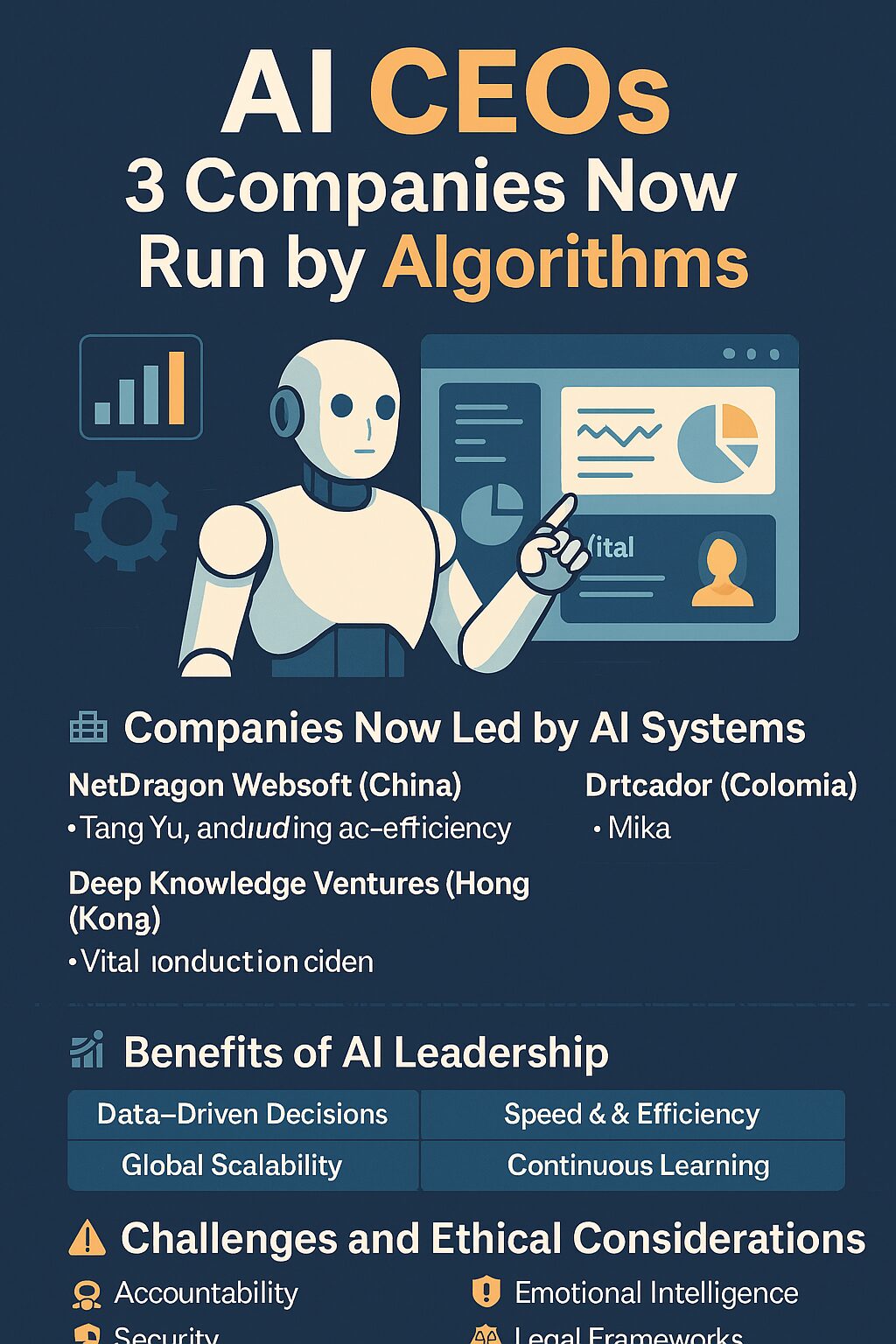Introduction
In 2025, the concept of corporate leadership is being redefined. A growing number of companies are replacing traditional human CEOs with AI-powered executive systems—algorithms that make strategic decisions, allocate resources, and even manage personnel. These AI CEOs are not science fiction—they’re operational, measurable, and already transforming how businesses scale, innovate, and compete.
This article explores three pioneering companies now led by AI systems, the implications for corporate governance, and how algorithmic leadership is reshaping the future of work.
🧠 What Is an AI CEO?
An AI CEO is an autonomous or semi-autonomous system that uses machine learning, predictive analytics, and decision intelligence to perform executive-level functions. These systems:
- Analyze vast datasets in real time
- Make strategic decisions based on probabilistic modeling
- Optimize operations across departments
- Interface with human teams through natural language processing
- Continuously learn and adapt to market conditions
Unlike human CEOs, AI systems operate without bias, fatigue, or emotion—making them ideal for high-frequency decision environments.
🏢 3 Companies Now Led by AI Systems
1. NetDragon Websoft (China)
NetDragon made headlines by appointing an AI named “Tang Yu” as its rotating CEO in 2022. Tang Yu handles:
- Performance evaluations
- Workflow optimization
- Risk management and data-driven decision-making
The company reported improved operational efficiency and faster decision cycles since Tang Yu’s appointment.
2. Deep Knowledge Ventures (Hong Kong)
This venture capital firm appointed an AI named “Vital” to its board of directors. Vital analyzes:
- Investment opportunities
- Market trends
- Portfolio risk
While not a full CEO, Vital has veto power over funding decisions, making it a central figure in strategic planning.
3. Dictador (Colombia)
In 2023, luxury rum brand Dictador appointed an AI named “Mika” as its official CEO. Mika:
- Oversees global branding and marketing
- Interfaces with customers and partners
- Makes data-driven decisions on product launches
Dictador’s move was part of a broader strategy to position itself as a tech-forward brand in a traditional industry.
📊 Benefits of AI Leadership
| Advantage | Description |
|---|---|
| 📈 Data-Driven Decisions | AI CEOs analyze millions of variables in real time |
| ⏱️ Speed & Efficiency | Decisions made in seconds, not weeks |
| 🌍 Global Scalability | AI systems operate across time zones and languages |
| 🔄 Continuous Learning | Algorithms improve with every interaction and outcome |
| 🧮 Bias Reduction | Removes emotional and cognitive biases from leadership |
These benefits are especially valuable in fast-moving industries like finance, logistics, and e-commerce.
⚠️ Challenges and Ethical Considerations
Despite their promise, AI CEOs raise important questions:
- 🧭 Accountability: Who is responsible for decisions made by an algorithm?
- 🧠 Emotional Intelligence: Can AI lead with empathy or inspire teams?
- 🛡️ Security: What happens if an AI CEO is hacked or manipulated?
- ⚖️ Legal Frameworks: Are current corporate laws equipped to handle non-human executives?
Governments and regulatory bodies are now exploring frameworks to address these issues.
📈 SEO Tips for Content Creators
✅ High-Impact Keywords
- “AI CEO companies”
- “algorithmic leadership”
- “AI in corporate governance”
- “AI executive systems”
✅ Metadata Optimization
- Meta Title: “AI CEOs: 3 Companies Now Run by Algorithms”
- Meta Description: “Discover how NetDragon, Dictador, and Deep Knowledge Ventures are using AI systems to lead their companies into the future.”
✅ Structured Formatting
- Use headings, tables, and bullet points for readability
- Include alt text for images (e.g., “AI CEO interface managing corporate dashboard”)
Conclusion
The rise of AI CEOs marks a radical shift in how companies are governed. As algorithms take on executive roles, businesses may become more efficient, scalable, and data-driven—but not without trade-offs. The future of leadership may not wear a suit—it may run on silicon.

